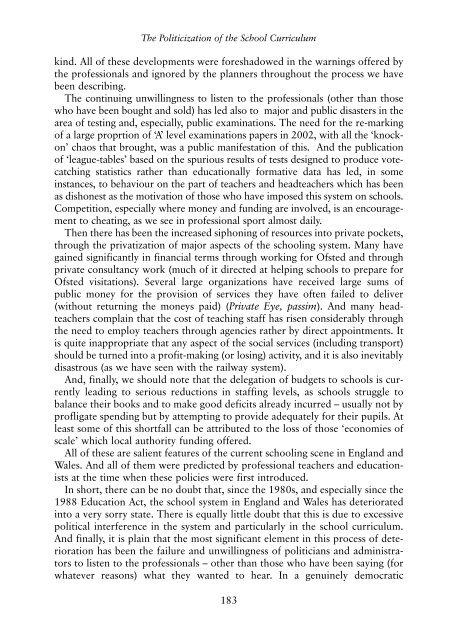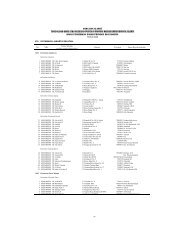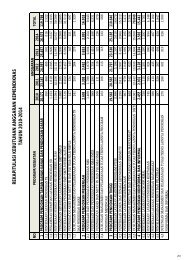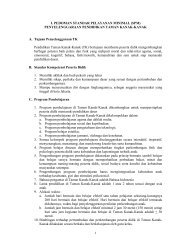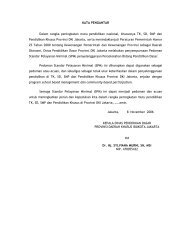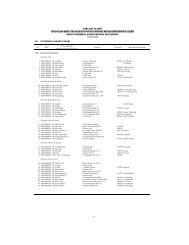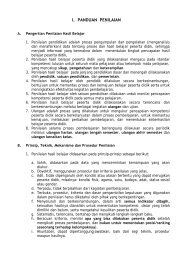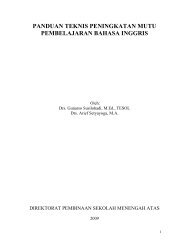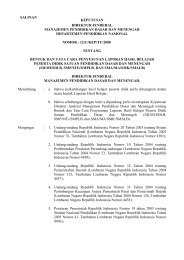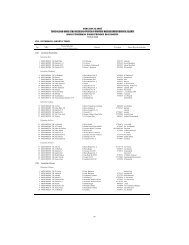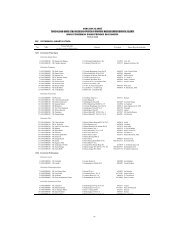The Curriculum - WordPress.com
The Curriculum - WordPress.com
The Curriculum - WordPress.com
You also want an ePaper? Increase the reach of your titles
YUMPU automatically turns print PDFs into web optimized ePapers that Google loves.
<strong>The</strong> Politicization of the School <strong>Curriculum</strong>kind. All of these developments were foreshadowed in the warnings offered bythe professionals and ignored by the planners throughout the process we havebeen describing.<strong>The</strong> continuing unwillingness to listen to the professionals (other than thosewho have been bought and sold) has led also to major and public disasters in thearea of testing and, especially, public examinations. <strong>The</strong> need for the re-markingof a large proprtion of ‘A’ level examinations papers in 2002, with all the ‘knockon’chaos that brought, was a public manifestation of this. And the publicationof ‘league-tables’ based on the spurious results of tests designed to produce votecatchingstatistics rather than educationally formative data has led, in someinstances, to behaviour on the part of teachers and headteachers which has beenas dishonest as the motivation of those who have imposed this system on schools.Competition, especially where money and funding are involved, is an encouragementto cheating, as we see in professional sport almost daily.<strong>The</strong>n there has been the increased siphoning of resources into private pockets,through the privatization of major aspects of the schooling system. Many havegained significantly in financial terms through working for Ofsted and throughprivate consultancy work (much of it directed at helping schools to prepare forOfsted visitations). Several large organizations have received large sums ofpublic money for the provision of services they have often failed to deliver(without returning the moneys paid) (Private Eye, passim). And many headteachers<strong>com</strong>plain that the cost of teaching staff has risen considerably throughthe need to employ teachers through agencies rather by direct appointments. Itis quite inappropriate that any aspect of the social services (including transport)should be turned into a profit-making (or losing) activity, and it is also inevitablydisastrous (as we have seen with the railway system).And, finally, we should note that the delegation of budgets to schools is currentlyleading to serious reductions in staffing levels, as schools struggle tobalance their books and to make good deficits already incurred – usually not byprofligate spending but by attempting to provide adequately for their pupils. Atleast some of this shortfall can be attributed to the loss of those ‘economies ofscale’ which local authority funding offered.All of these are salient features of the current schooling scene in England andWales. And all of them were predicted by professional teachers and educationistsat the time when these policies were first introduced.In short, there can be no doubt that, since the 1980s, and especially since the1988 Education Act, the school system in England and Wales has deterioratedinto a very sorry state. <strong>The</strong>re is equally little doubt that this is due to excessivepolitical interference in the system and particularly in the school curriculum.And finally, it is plain that the most significant element in this process of deteriorationhas been the failure and unwillingness of politicians and administratorsto listen to the professionals – other than those who have been saying (forwhatever reasons) what they wanted to hear. In a genuinely democratic183


